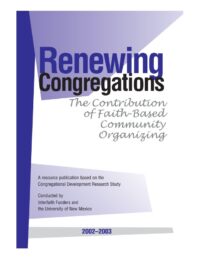At St. Joseph the Worker Catholic Church in McAllen,Texas, Lupita Mendiola and fellow lay leaders have, with support from pastor Fr. Bart Flaat, grown a struggling congregation into a thriving church that is an economic, political, and spiritual force in the poverty-stricken Rio Grande Valley.
In less than two years, Rabbi Jonah Pesner and leaders Fran Godine and Steve Silverman, at Reform synagogue Temple Israel in Boston, revitalized relationships among members and brought new depth, energy and effectiveness to their long tradition of fulfilling the Jewish obligation to work for social justice.
In St. Paul, Minnesota, the Evangelical Lutheran Church in America is undertaking a bold experiment.They called a pastor newly trained in community organizing to a church that was in danger of closing, hoping that he and lay leaders like Diane Breanan and Ronald Stamper could use what he had learned to save, and even grow the small congregation.
Bishop Roy Dixon and lay leaders like Cookie Hassan and Duret Gray, of Faith Chapel Church of God in Christ congregation in San Diego increased the membership of their church from six to 1500 over the past twelve years.
What brought about such transformations?
All of these congregations, among others discussed later, were strengthened through their participation in one of the approximately 160 faith-based community organizing (FBCO) groups in the United States. FBCO is a model of community organizing based on networks of relationships that people create primarily through their religious congregations, but also through their unions, community organizations and children’s schools. Faith-based community organizing groups believe that their primary role is to develop participants’ leadership skills, build strong networks of relationships grounded in shared values and concerns, and channel those relationships into a civic power capable of making change for the public good. Most FBCO groups belong to one of the national or regional organizing and training networks (Pacific Institute for Community Organization–PICO; Industrial Areas Foundation–IAF; Gamaliel Foundation; Direct Action, Research and Training Center–DART; Regional Congregations and Neighborhood Organizations Training Center–RCNO; InterValley Project–IVP; and Organizing Leadership and Training Center–OLTC). While FBCO groups have a notable list of achievements on many public issues (see Resources for Further Exploration), this study examined a different matter. That is, “Congregational Development,” or how congregations are strengthened and sometimes transformed by their participation in faith-based community organizing.
More specifically, for the purposes of the study,“Congregational Development” (CD) means the growth of members as multi-faceted leaders within their congregations and the strengthening of congregations as institutions. For individuals this includes gaining leadership skills useful in congregational life and the public arena, deepening engagement in congregational life, and strengthening their understanding of the connections between their faith tradition’s call to social justice and the work of faith-based community organizing. For congregations, this includes the strengthening of relationships between groups and individuals within the congregation, the creation of connections to other congregations and community/government organizations, a deepening of linkages between worship life and the congregation’s presence in the wider social world, a transforming of congregational culture to be more relational and accountable, and potential growth in membership.
The two-year Congregational Development Research Study evolved from conversations with faith-based community organizing stakeholders who were convinced of the democratic significance of FBCO but unsure about its impact on congregations. To address this question, researchers led by Dr. Richard L. Wood studied congregational development (CD) through faith-based community organizing in forty-five religious congregations, including Lutheran, Baptist, Episcopalian, Jewish, Methodist, Pentecostal, Presbyterian, Roman Catholic, Unitarian/Universalist, Unity, Muslim, and non-denominational/evangelical congregations. Some were highly multiracial, while the others constituted a rich mix of majority Latino, African American, black Caribbean, or white/European congregations. In the field, researchers observed congregations in action and conducted hour-long interviews with leaders, clergy, and organizers from congregations belonging to thirteen faith-based community organizing groups at sites around the country: Los Angeles (RCNO); San Diego; Texas’ Rio Grande Valley; Miami; Minneapolis/St. Paul; Portland, Oregon; Columbus, Ohio; New Orleans; Camden, New Jersey; Chicago; Detroit; Boston; and Los Angeles (IAF).
Click here to download a PDF of the full report.
This report was published by Interfaith Funders in 2003. Though the network is no longer in operation, Interfaith Funders transferred several of its reports and articles, including this report, to the USC Center for Religion and Civic Culture to preserve and push forward the insights gained through its work.
